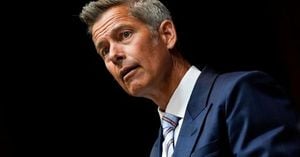It’s not every day that a major American newspaper’s editorial direction becomes the story itself, but that’s exactly what’s happened at The Washington Post in recent months. The paper, long considered a bastion of center-left commentary and a critical voice in national politics, has undergone a dramatic and contentious transformation under the watch of billionaire owner Jeff Bezos. The shift, marked by staff upheaval, ideological realignment, and public admissions from its own columnists, has left readers, journalists, and political observers alike asking: What’s going on at the Post?
The latest flashpoint came on October 9, 2025, when columnist Marc Thiessen published a provocative op-ed titled “Yes, Trump Deserves the Nobel Peace Prize.” The piece, which lavished praise on former President Donald Trump’s peacemaking efforts, quickly went viral. Trump himself was quick to amplify the column, sharing it on his Truth Social platform with the exclamation, “Thank you Washington Post. Wow!” according to Mediaite and other outlets. For the former president, who has long sought validation from mainstream media, the endorsement was a moment to savor.
But the real fireworks began when Mark Dubowitz, CEO of the Foundation for Defense of Democracies, highlighted Thiessen’s column on X (formerly Twitter), calling him “a (welcome) outlier at the Washington Post.” Thiessen’s reply was both candid and telling: “Thanks Mark. But not such an outlier any more! We’re now a conservative opinion page.” The admission, as reported by The Independent, confirmed what many staffers and readers had suspected—that the Post’s opinion section had swung sharply to the right.
This shift didn’t happen overnight. The seeds were sown in February 2025, when Bezos announced a new editorial mandate for the opinion section: it would be “dedicated to the support and defense of two pillars: personal liberties and free markets.” He added, “We’ll cover other topics too, of course, but viewpoints opposing those pillars will be left to be published by others.” The statement, delivered on the same night Bezos reportedly dined with Trump, signaled a clear ideological realignment. As Mediaite noted, the move was a departure from the Post’s previous endorsements of Democratic candidates like Joe Biden, Hillary Clinton, and Barack Obama.
The fallout was swift and severe. The Post, according to Status News’ Oliver Darcy, saw a flood of veteran columnists and editors exit the paper. Many accepted buyouts offered by publisher Will Lewis to those who “do not feel aligned” with the new direction. Others resigned in protest, including longtime columnist Joe Davidson, who in June 2025 accused Bezos of being a “Trump supplicant” and claimed his articles were censored for being “too opinionated.” The exodus wasn’t limited to left-leaning voices; even opinion editor David Shipley stepped down, making way for Adam O’Neal, a 33-year-old former correspondent for The Economist and editorial writer for The Wall Street Journal.
O’Neal’s arrival marked a new era—and not without controversy. In the months since taking the helm, he has let go of at least a half-dozen staffers and several high-profile contractors, including editor Benjy Sarlin, media critic Jack Shafer, and respected journalist Marc Fisher, who had spent nearly four decades at the Post. Meanwhile, O’Neal has recruited new columnists from conservative outlets such as The National Review, The Spectator, and The Boston Globe. According to Darcy, “People who have spoken to O’Neal have said he has signaled that he very much wants to recruit those on the political right to The Post.”
The ideological shift hasn’t gone unnoticed outside the newsroom. In March, White House press secretary Karoline Leavitt praised the Post for “finally learning,” a nod to its newfound embrace of conservative and libertarian values. Meanwhile, columnist David Ignatius appeared on MSNBC to praise Trump’s Gaza peace plan, declaring, “Joe Biden could never do that. And Donald Trump was able to do it.” The Post’s willingness to publish and promote such commentary has drawn both applause and outrage, depending on one’s political persuasion.
Yet not all the changes have been welcomed, even among those sympathetic to the new direction. Last month, Karen Attiah, the founding Global Opinions editor who rose to prominence following the murder of columnist Jamal Khashoggi, was fired after making what the Post deemed “unacceptable” social media posts in the wake of Charlie Kirk’s murder. Attiah, who was the last full-time Black columnist on staff, publicly criticized her dismissal, underscoring concerns about diversity and viewpoint representation at the paper.
The Post’s rightward tilt has also had consequences for its bottom line. As reported by The Independent, the paper has experienced a steady decline in readership and a wave of subscription cancellations. The backlash intensified after Bezos blocked a planned presidential endorsement of Kamala Harris in 2024, which prompted several editorial board members to resign in protest. Since then, the paper’s editorial stance has only grown more overt, with Bezos and O’Neal unapologetically steering the opinion section toward “personal liberties and free markets.”
In his Thursday column, Thiessen pulled no punches in his endorsement of Trump, writing, “Not only does Donald Trump deserve the Nobel Peace Prize, but there has arguably never been an American president who deserved it more.” He cited what he described as Trump’s “unprecedented peacemaking accord,” a claim that drew both support from MAGA personalities and incredulity from critics. Far-right host Jack Posobiec, for example, shared a screenshot of the headline with the incredulous comment, “No way.”
The new editorial direction has also led to public spats and accusations of censorship. Davidson’s resignation letter accused the paper of “killing” and censoring his articles, while others have pointed to the firing of Attiah and the departures of longtime staffers as evidence of a purge of dissenting voices. O’Neal has defended his approach, granting his first public interview as opinion editor to Fox News—another signal of the paper’s changing alliances.
For some, the Post’s transformation represents a long-overdue correction to what they saw as a left-leaning orthodoxy. For others, it’s a betrayal of the paper’s storied legacy and a capitulation to political pressure. Whatever one’s perspective, the facts are clear: under Bezos’s ownership, the Post’s opinion section has become a battleground for the soul of American journalism, with consequences that ripple far beyond the newsroom.
As the dust settles, readers are left to decide whether the Post’s new editorial stance offers a refreshing diversity of thought or simply narrows the range of voices in one of the country’s most influential newspapers. With more staff changes likely on the horizon and the 2026 election season heating up, the debate over the Post’s future is far from over.




